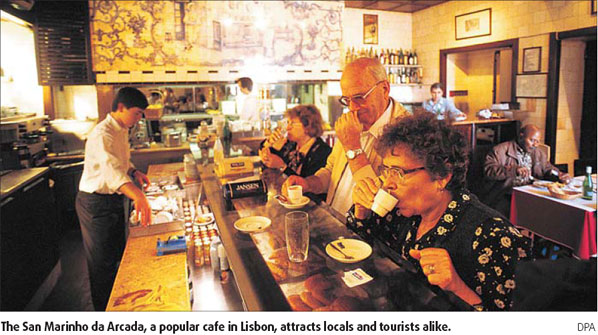Secret tarts are still melting hearts

LISBON: The coffee machine hisses, dishes clatter, and a buzz of voices fills the room. It is early in the morning and Lisbon's Cafe Nicola is already busy: Businesspeople are poring over newspapers, retired people are sipping coffee.
The Nicola is a slice of everyday life in the Portuguese capital. But it is hardly the only one. A host of cafes, restaurants, bars and pubs attract locals and tourists alike with an impressive selection of desserts, fish dishes, cheese, wine and liqueurs brewed right on the premises.
Cafes and restaurants were the heart of Lisbon's social life as early as the 18th century. Well-to-do residents, intellectuals and artists frequented them to write novels or discuss politics. Some men spent so much time in cafes that the places became their second address, to which a small mailbox behind the bar in Cafe Nicola still bears witness.
Although Portugal's cuisine is often overshadowed by Spain's, it deserves more credit than it gets. Portuguese seafarers of yore brought back exotic spices and foods from their journeys and incorporated them into the domestic cuisine, which is characterized by great variety to this day.
Fresh ingredients are a must at markets, in restaurants and in corner shops. And the numerous fancy pastry shops give themselves away by the aroma of vanilla custard and meringue batter wafting through Lisbon's winding streets.
The food has a downside, however: It is heavy in calories.
"That's why Portuguese cuisine is changing now," says Vitor Sobral, proprietor of the Terreiro do Paco restaurant on the Praca do Comercio. "I want to preserve traditional dishes as part of our culture, but prepare them in a modern way."
And so stockfish or bacalhau, a Portuguese specialty, is a fixture on Sobral's menu. Although the fish, which is generally dried, has long been prepared in a way that often makes it very salty and greasy, Sobral's version tastes tender and light.
"Previously, chefs simply tossed all of the ingredients into a pot and poured a lot of olive oil on them. We use modern techniques today," he says.
Among Portugal's culinary innovators are foreign chefs like Joachim Koerper, a German. Koerper runs the Eleven restaurant in the northern part of Lisbon. The eatery's glass front pleases the eye with a beautiful panoramic view of the city. Inside, salmon pates, rabbit, cucumber gazpacho, sardine terrine, and fish tickle the palate.
The fare is much richer in the western suburb of Belem. The Antiga Confeitaria, a bakery and cafe there, produces Lisbon's most famous dessert or pasteis de Belem.
The small, custard tarts in delicate layers of puff pastry are served warm with cinnamon and powdered sugar.
Just three chief confectioners know the recipe. As a precaution, they never travel together.
These little tastes of heaven dissolve so easily on the tongue that thousands of people go to the Antiga Confeitaria daily to enjoy them.
On weekends the crush is so great that the bakers churn out 15,000 a day. Customers who find the crowd too big can have their tarts boxed and then munch them in a park opposite the cafe.
DPA
(China Daily 11/08/2007 page19)














